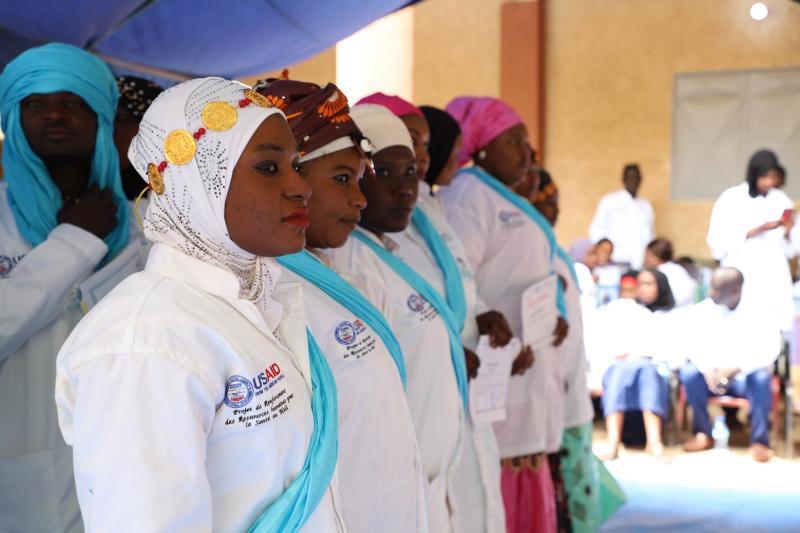Where We Work
See our interactive map


Health workers at their graduation ceremony in Gao, Mali in February 2020. Photo by Doucoure Sekou for IntraHealth International.
Eight nursing and midwifery schools in Mali—a country that has long experienced a shortage of qualified nurses and midwives—are now accredited and using a competency-based approach curriculum, compared to only three schools in 2017.
Thanks to a partnership between IntraHealth International and Mali’s Ministry of Health and Social Development, the number of accredited nursing and midwifery schools has more than doubled and 829 more nursing and midwifery students are benefitting from a high-quality education, improving the quality of the health workforce in Mali.A new report—Accreditation of private midwifery and nursing schools in Mali: a local sustainable solution to increasing the supply of qualified health workers—outlines how the partnership has worked to improve the quality of education in Mali’s private universities, better manage the country’s available health workers, and initiate a decentralized strategy for health worker recruitment and motivation.
Mali has an average of 6 health workers per 10,000 people (the World Health Organization recommends 23 skilled health workers per 10,000 people). Northern regions such as Timbuktu, Gao, and Kidal have 4, 5, and 13 health workers per 10,000 people respectively, while the capital of Bamako has 23.
We need to focus on our shortage of health workers.
“We need to focus on our shortage of health workers,” says Cheick Touré, IntraHealth’s country director in Mali. “We know that the density of health workers is high in the cities but in the rural areas it’s very low. We need to recruit nurses and community health workers there to provide services for women in their communities.”
Since 2017, the USAID-funded Mali Human Resources for Health Strengthening Activity, led by IntraHealth, worked with the Ministry of Health and Social Development and Ministry of Higher Education and Scientific Research in six regions to train more health workers by improving the quality of education in private universities, better manage available health workers through the iHRIS health workforce information system, and address the low rate of retention of health workers in rural and hard-to-reach areas.
As part of this effort, IntraHealth collaborated with national and regional decision-makers using the West African Health Organization (WAHO) accreditation system to help 10 private nursing schools introduce WAHO’s regionally accepted, competency-based curriculum in reproductive, maternal, newborn, and child health (RMNCH).
Accreditation is an essential part of improving health training institutions—a key mechanism for assuring quality and protecting public health and safety. Additionally, having an accredited institution increases the number of student applications, thus expanding the pipeline of new health workers. As a result of this work:
Introducing a standardized regional curriculum in Mali has helped improved graduation rates and student enrollment as well as the quality of health worker training. IntraHealth’s support to the regulatory bodies that oversee accreditation has helped more schools sustainably complete the process in Mali. Now, other countries in the region who similarly rely on private sector institutions for health workers have a model to utilize to increase their own health workforce.
IntraHealth International is now partnering with Takeda Pharmaceutical Company Limited and 12 private schools in Mali, Senegal, and Niger to sustainably increase the number of qualified, well-trained nurses who can serve rural communities in these countries—all of which face a critical shortage of health workers. To learn more about the new Improving Maternal and Child Health Care in Rural West Africa Through High-Quality Education for Nurses and Midwives project, click here.



